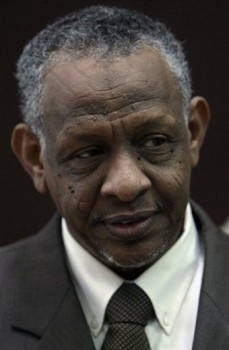Sudan admits army facing headwinds in its war against rebels
June 13, 2013 (KHARTOUM) – The Sudan Revolutionary Front (SRF) has its eye set on the capital Khartoum as part of a new plan that is based on part on coordination with political opposition groups, a senior Sudanese official said today.
 Nafie Ali Nafie, the deputy chairman of the ruling National Congress Party (NCP) who is also presidential assistant, told the Khartoum state legislative assembly that SRF chairman Malik Agar sent a letter to South Sudan government outlining his new military strategy nicknamed ‘Plan B’.
Nafie Ali Nafie, the deputy chairman of the ruling National Congress Party (NCP) who is also presidential assistant, told the Khartoum state legislative assembly that SRF chairman Malik Agar sent a letter to South Sudan government outlining his new military strategy nicknamed ‘Plan B’.
He said that ‘Plan B’ was drafted after SRF lost Abu-Kershola area in South Kordofan to Sudan army in late May following a one month occupation.
The letter stressed the need to “localize” SRF elements in major cities such as Kadugli (South Kordofan), Al-Obeid (White Nile) and El-Fasher (North Darfur).
But the army managed to block deployment of SRF fighters east of South Kordofan state at a battle in Um-Burambeita, Nafie said.
Nafie reveled that the army will focus more on securing Darfur towns to protect it from rebel assault and particularly in El-Fasher and Nyala (South Darfur).
But he ruled out the possibility that SRF could overrun El-Fasher adding that Darfur is mostly free from any rebel presence except of few pockets with forces belonging to Sudan Liberation Movement of Minni Minnawi (SLM-MM).
In late April, SRF rebels, who aim to topple the regime of President Omer Hassan al-Bashir took control of Abu-Kershola as part of a wide offensive that saw them briefly occupying North Kordofan second largest town of Um Rawaba.
The attack was significant given the fact that rebel activity has been mostly limited to the states of Darfur, Blue Nile and South Kordofan. Residents said that the rebels were met with little resistance from government forces there.
The Sudanese official pointed out that the defeat suffered by the SRF in Abu-Kershola makes the Ministry of Defence planning ahead and taking the necessary precautions with the necessary strength adding that the rebels are determined to push ahead and never go back.
However, Nafie cautioned lawmakers that the army lacks the necessary “deterring” force in the face of the rebels and implored upon the Sudanese people to mobilize and beef up their support of the military.
Some Sudanese officials have privately expressed frustration with the lack of response to their army recruitment calls in recent months in the wake of stepped up military attacks by the insurgents.
Officials in Khartoum have also repeatedly warned about imminent rebel plans to invade Khartoum.
“We need a major political and military mobilization campaign so that the army is presence in all locations,” Nafie said. He called on all leadership figures with military experience to lead these campaigns.
Nafie claimed that SRF wants to move into the capital from the direction of North Darfur and South Kordofan.
He linked this plan to the recent announcement by the oppositions of the 100-day plan to topple the regime that consists of launching mass rallies in different parts of Sudan. The Grand finale, he said would occur in the latter part of June with the entry of SRF forces into Khartoum.
In a related issue, Nafie said that averting oil shutdown announced by president Omer Hassan al-Bashir last week would require South Sudan to suspend the support they provide to RF rebels
“We will not open our borders to South [Sudan] oil that feeds the rebels,” Nafie said.
The presidential assistant however said that South Sudan is “victim” to external forces which are dictating how Juba should act.
In September of last year, both Sudan and South Sudan signed a series of cooperation agreements, which covered oil, citizenship rights, security issues, banking, border trade among others.
However only last March, the two countries signed an implementation matrix for these deals which was hailed as a major breakthrough in the mostly tense relations between the two ex-foes.
The most notable provision in the agreement is related to resumption of oil exports by landlocked South Sudan which were suspended more than a year ago because of a dispute over transit fees. Oil started flowing again in April.
But last week Bashir ordered his oil minister to shut down the pipeline in response to Juba’s backing of the rebels.
(ST)
